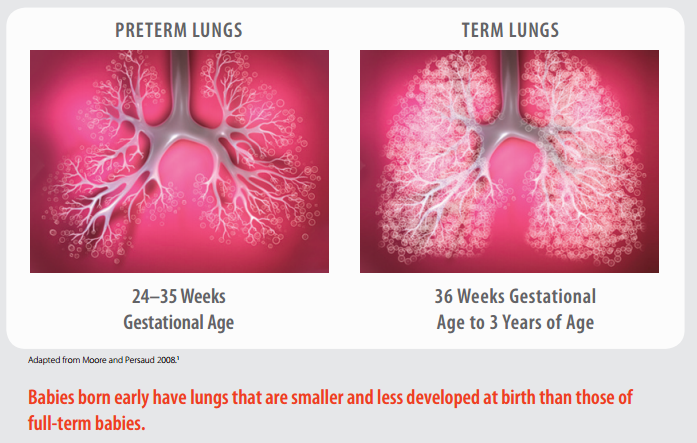 Source: bing.com
Source: bing.comAs a new mom, you may be wondering when your baby’s lungs begin to develop. After all, healthy lungs are essential for your baby’s overall health and well-being. In this guide, we will explore everything you need to know about when babies’ lungs begin to develop and what you can do to support their lung health.
Table of Contents
When Do Babies Lungs Begin To Develop?
Babies’ lungs begin to develop early in pregnancy, around the fourth week after conception. At this stage, the lungs are just tiny buds, and they continue to grow and develop throughout pregnancy.
By the end of the first trimester, around 12 weeks, the baby’s airways and lung tissue have formed. However, the lungs are not yet fully functional, and the baby cannot breathe on their own. The lungs continue to mature throughout the second and third trimesters.
By the time a baby is born, their lungs are fully formed and capable of breathing air. However, it may take a few hours or even a few days for the lungs to adjust to breathing outside of the womb.
What Factors Affect Lung Development in Babies?
Several factors can impact lung development in babies. Here are a few:
- Maternal smoking or exposure to secondhand smoke
- Poor maternal nutrition
- Premature birth
- Low birth weight
- Respiratory infections
If you are pregnant or planning to become pregnant, it’s essential to take steps to support your baby’s lung development. Quitting smoking, eating a healthy diet, and getting regular prenatal care are all crucial for your baby’s overall health and well-being.
How Can You Support Your Baby’s Lung Health?
There are several things you can do to support your baby’s lung health:
- Avoid smoking and exposure to secondhand smoke
- Eat a healthy diet rich in fruits, vegetables, and whole grains
- Get regular prenatal care
- Avoid exposure to environmental toxins
- Breastfeed your baby
Breastfeeding is especially important for your baby’s lung health. Breast milk contains antibodies that can protect your baby from respiratory infections and other illnesses that can impact lung health.
When Should You Be Concerned About Your Baby’s Lung Health?
In most cases, babies are born with healthy lungs that continue to mature and develop after birth. However, if you notice any of the following signs, it’s important to talk to your baby’s healthcare provider:
- Rapid or difficult breathing
- Wheezing or coughing
- Blue or pale skin
- Low oxygen levels
- Fever or other signs of illness
If your baby is born prematurely or has other health issues, their healthcare provider may recommend additional monitoring or treatment to support their lung health.
In Conclusion
Overall, healthy lungs are essential for your baby’s overall health and well-being. Babies’ lungs begin to develop early in pregnancy and continue to mature throughout gestation. By taking steps to support your baby’s lung health, such as quitting smoking, eating a healthy diet, and breastfeeding, you can help ensure that your baby’s lungs develop properly. If you have any concerns about your baby’s lung health, be sure to talk to their healthcare provider.
So, when do babies’ lungs begin to develop? The answer is early in pregnancy, around four weeks after conception. By taking steps to support your baby’s lung health, you can help ensure that they have healthy lungs that will serve them well throughout their life.
Frequently Asked Questions
- Can my baby’s lungs be damaged during pregnancy?
- What can I do to support my baby’s lung health?
- When should I be concerned about my baby’s lung health?
- Is breastfeeding important for my baby’s lung health?
- Can premature babies have healthy lungs?
Yes, several factors can impact lung development in babies, including maternal smoking or exposure to secondhand smoke, poor maternal nutrition, premature birth, low birth weight, and respiratory infections. To support your baby’s lung health, it’s essential to take steps to avoid these risk factors.
To support your baby’s lung health, you can take steps such as avoiding smoking and exposure to secondhand smoke, eating a healthy diet, getting regular prenatal care, avoiding exposure to environmental toxins, and breastfeeding your baby.
If you notice signs such as rapid or difficult breathing, wheezing or coughing, blue or pale skin, low oxygen levels, or fever or other signs of illness, it’s important to talk to your baby’s healthcare provider.
Yes, breastfeeding is essential for your baby’s overall health and well-being, including their lung health. Breast milk contains antibodies that can protect your baby from respiratory infections and other illnesses that can impact lung health.
Yes, premature babies can have healthy lungs with proper monitoring and treatment. If your baby is born prematurely, their healthcare provider may recommend additional monitoring or treatment to support their lung health.
